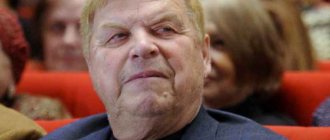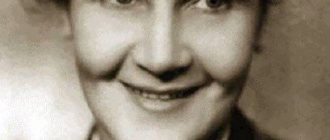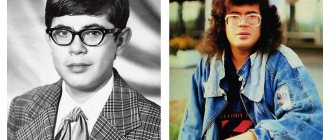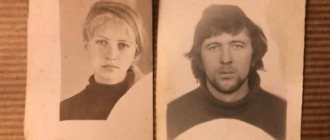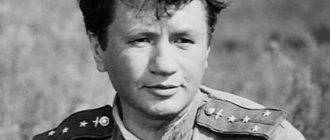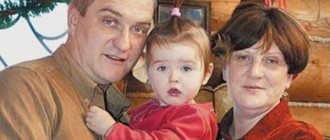Height, weight, age. Years of life of Mikhail Ulyanov
Mikhail Ulyanov, whose photos in his youth and now are still collected by admirers of his talent, had a tall height of 181 centimeters. The actor weighed 93 kilograms.
After the release of “The Battle of Moscow”, “Liberation” and other significant films on the screens of the country, the film actor gained numerous fans. They knew everything about the artist for certain, including height, weight, age. The years of life of Mikhail Ulyanov are also quite easy to find out. Our hero lived a long life; he did not live one year to see his 80th birthday.
Since adolescence, Ulyanov had a bad habit. He smoked 2 packs of cigarettes a day. For the sake of his beloved Allochka, the man gave up smoking for one day. He began to play sports, believing that this was what would help him live a long time.
Personal life
Mikhail Ulyanov was ideal not only on stage and on camera, but also in life. The actor lived happily with his wife Alla Parfanyak for half a century. They met at the Theater. Vakhtangov, where both worked. For four years, Mikhail Ulyanov courted Alla and achieved her favor. By that time, his chosen one was married to Nikolai Kryuchkov and was raising a son. And Mikhail was far from the female ideal, because he drank a lot.
Biography of Mikhail Ulyanov
The biography of Mikhail Ulyanov began in 1927. His father, Alexander Ulyanov, led a wood processing team. Mother, Elizaveta Ulyanova, did housework and raised children. Mikhail had a younger sister, Margarita.
The boy spent the first three years of his life in the small village of Bergamak. After this, the family lived in Ekaterininsky, and then in Tara, where the future film actor spent his childhood and youth. Misha studied mediocrely. He liked playing in theatrical productions and playing sports much more.
In the first days of the war, our hero's father went to the front as a volunteer. The man was wounded several times. Received the Order of the Red Star.
In 10th grade, the future artist received a summons to the army. But he never made it to the front. An order was issued according to which young men born in 1927 had to finish their studies at school.
At the age of 15, Mikhail Ulyanov visited the theater. It was at this time that he decided to become an actor. A talented guy goes to Omsk. He initially studies at the drama studio at the drama theatre. At the same time, the young man got a job on the radio. He hosted programs in the mornings. At this time he lost his voice. After treatment, a unique timbre was obtained, which was remembered by many fans of Soviet cinema.
After graduating from the Omsk theater studio, Mikhail receives his father’s blessing and sets off to conquer Moscow. On his first attempt, the young man was unable to become a student at theater universities. But still he managed to enter the Shchukin School. After college, Ulyanov began working at the Vakhtangov Theater.
At the beginning of the new millennium, a popular film actor began to get sick. His health was getting worse. Soon doctors diagnosed an oncological disease, from which Mikhail Alexandrovich died. The great artist was buried at the Novodevichy cemetery with military honors.
Soviet childhood of Misha Ulyanov
Mikhail's father Alexander Ulyanov was the director of a woodworking enterprise, his mother Elizaveta Ulyanova devoted her entire life to her family, raising her son Misha and daughter Margarita.
When the boy was 3 years old, the Ulyanovs moved first to the village of Ekaterininskoye, not far from Bergamak, and then to the city of Tara, where the future great actor spent his childhood. Mikhail's childhood was no different from the childhood of any Soviet child of those years: he participated in yard games, ran with friends to the local cinema, and went hiking. At school, Ulyanov was never an excellent student, as he was seriously interested in literary evenings, but until the age of 15, Mikhail had no idea about the theater. Then the city was visited by troupes of the Omsk and Tobolsk theaters, and later Mikhail accidentally dropped in on the rehearsals of the children's theater studio at the Ukrainian theater, which was evacuated in Tara. In the studio, the children read poetry, and Mikhail, passionate about literature, gradually became addicted to the theater. Later, his director Evgeny Prosvetov, realizing that the boy had the makings of an artist, recommended that he enter the studio at the Omsk Regional Theater.
Filmography: films starring Mikhail Ulyanov
From this time on, Mikhail Alexandrovich began to actively act in films. His filmography includes more than 70 works in various films. He is remembered for his work in “Volunteers”, “Liberation” and many others. The film actor embodied a large number of different images on the screen, but in particular, according to his fans and critics, he was successful in the image of the Hero of the Soviet Union, Marshal of Victory Georgy Konstantinovich Zhukov.
Ulyanov was awarded a large number of prizes and awards. According to his own admission, made shortly before his death, the greatest reward for him was the recognition of the audience and his personal satisfaction with his work.
Movies
Ulyanov’s first film role was Yakov Laptev in the film “Yegor Bulychev and Others.” The film was released in 1953, but was not a success with audiences. Then there were roles in the films “Volunteers”, “The House I Live In”, “Chairman”, “The Brothers Karamazov”. For the role of Trubnikov, the actor received the Lenin Prize.
Mikhail Ulyanov in the film “The House Where I Live”
Mikhail Ulyanov had to play both generals and kings in films. Marshal Zhukov in his performance was so believable that the actor spent a quarter of a century creating him on screen, in a total of 12 films. In the dashing 90s, the actor continued to actively act in films. These years were marked by the films “Politburo Cooperative”, “Everything will be fine”, “The Last Escape”, “Without Witnesses”, “Moscow Elegy”.
Mikhail Ulyanov in the film “Voroshilovsky Shooter”
One of the most successful film roles of this period was “The Voroshilov Shooter.” Mikhail Ulyanov saw behind the story of his hero the tragedy of all elderly people who had to endure repression, war, perestroika and find themselves alone with their troubles. Mikhail Ulyanov played almost 70 roles. Critics spoke of him as an actor who could play any role - from tough, principled leaders to cowards and informers.
Personal life of Mikhail Ulyanov
The personal life of Mikhail Ulyanov took place in front of his many fans. In the 50s, the artist fell in love with a girl, Alla, who at that time was the wife of another popular film actor, Nikolai Kryuchkov. A son grew up in the family, named after his husband, but the mutual love between Mikhail and Allochka was able to overcome all obstacles. The woman left her former husband, taking her son with her. She lived happily for the next 50 years with Ulyanov.
The happiness of the spouses was cloudless. They never quarreled. In 2005 they celebrated their golden wedding.
After the death of her beloved husband, Alla did not live long. She fell into a coma and died. The woman was buried next to the grave of her beloved husband.
Personal life and family
During his student years, young Mikhail became interested in a beautiful classmate from Ukraine. But the relationship did not develop, and Nina Nekhlopochenko left for Odessa.
The beautiful Alla Parfanyak became the woman of Mikhail’s life. By the time they met, she was a star of Soviet cinema, starred in the film “Heavenly Slug”, was married to the audience’s idol Nikolai Kryuchkov, and had a son from him.
For several years, Mikhail courted the beautiful actress and conquered her: in 1959 they got married, and in December of the same year, Mikhail and Alla had a daughter, who was named Lenochka.
Ulyanov idolized his wife. Due to the nature of his work and being among beautiful actresses, novels were constantly attributed to him, but Mikhail denied everything, and his wife, knowing the vicissitudes of acting, turned a deaf ear to the gossip.
She vigilantly monitored his health, he wrote her touching poems, for which he did not have the ability, and Mikhail tried very hard...
With wife and daughter
The first granddaughter became the grandfather’s boundless happiness and worry: she was born with a heart defect, and Mikhail Alexandrovich gained the attention of M.S. Gorbachev himself to resolve the issue of the operation. At the end of his life, Ulyanov managed to see his twin great-grandsons Igor and Nastenka, this was the latest news; two weeks later his great-grandfather passed away.
Mikhail Alexandrovich and Alla Petrovna lived for more than fifty years and celebrated their golden wedding. After the death of her husband, Alla Petrovna lived only two years and died in 2009.
The artists' daughter, Elena Mikhailovna, listened to her parents' advice and did not enter the theater school. She worked as an artist for a long time, and now heads the charitable foundation named after. M. Ulyanova.
Daughter of M. Ulyanov-Elena Mikhailovna
Family of Mikhail Ulyanov
Mikhail Ulyanov's family consisted of himself, his beloved wife Allochka, daughter Elena and granddaughter Elizaveta. For a long time, despite the fame of the popular film actor, they lived in a small one-room apartment. Only at the beginning of the new millennium did they manage to purchase a three-room apartment.
The artist loved his daughter and granddaughter madly. His granddaughter, named after his mother, needed heart surgery. Mikhail Alexandrovich found the money. After a successful intervention, the girl became healthy. Shortly before his grandfather passed away, he had great-grandchildren, whom they decided to name Nastya and Igor. According to the stories of Ulyanov’s daughter, the boy is very similar to his great-grandfather.
Ulyanov Mikhail Alexandrovich
Theater works
Theater named after E.B. Vakhtangov
1950 - “State Advisor” - Volodya Barkan 1950 - “Makar Dubrava” by A. E. Korneychuk - Artem 1951 - “Fortress on the Volga” by I. L. Kremlev - Sergei Kirov 1951 - “First Joys”, based on the novel by K. A. Fedina - Kirill Izvekov 1951 - “The Great Sovereign” by V. A. Solovyov - Boris Godunov 1951 - “Yegor Bulychov and Others” by M. Gorky - Laptev 1952 - “In Our Days” - Chorokhov 1952 - “Grey-haired Girl” by He Ching-chih and Dean Nee - district chief 1952 - “The Two Gentlemen of Verona” by W. Shakespeare; production by A. Orochko - Eglamour 1953 - “Crayfish” by S. V. Mikhalkov - Lefty 1953 - “New Times” by G. D. Mdivani - Sukhov 1954 - “To be afraid of grief is not to see happiness” by S. Ya. Marshak; soldier Ivan 1955 - “On the Golden Bottom” by D. N. Mamin-Sibiryak; production by A. I. Remizova - Vasya 1955 - “Oleko Dundich” by A. G. Rzheshevsky and M.A. Katz; Kliment Voroshilov 1956 - “Filumena Marturano” by E. De Filippo; production by E. Simonov - Michele 1956 - “The Sixth Floor” by A. Gery; production by N. Gritsenko - worker Jojo 1957 - “City at Dawn” by A. N. Arbuzov; production by E. Simonov - Kostya Belous 1958 - “The Idiot”, based on the novel by F. M. Dostoevsky; production by A. Remizova - Rogozhin 1958 - “Angel” - Stratos 1959 - “The Irkutsk Story” by A. N. Arbuzov; production by E. Simonov - Sergey Seregin 1959 - “The Cook” by A. V. Sofronov - Seraphim Chaika 1961 - “The Married Cook” by A. V. Sofronov; production by R. Simonov - Seraphim Chaika 1962 - “Black Birds” by N. F. Pogodin - Andrei Pervozvanov 1963 - “Princess Turandot” by C. Gozzi; production by E. Vakhtangov 1965 - “Dion”, based on the play “Russian Comedy” by L. Zorin; production by R. Simonov - Dion 1966 - “Cavalry”, based on the stories of I. E. Babel; production by R. Simonov - Guleva 1967 - “Virineya” by L. N. Seifullina and V. Pravdukhin - Pavel Suslov 1967 - “Warsaw Melody” by L. G. Zorin; production by R. Simonov - Victor 1969 - "Coronation" by L. G. Zorin - Yakov Ivanovich 1971 - "Antony and Cleopatra" by W. Shakespeare; production by E. Simonov - Mark Antony 1975 - "Little Tragedies" by A. S. Pushkin - The Miserly Knight 1975 - "Front" by A. E. Korneichuk - Ivan Gorlov 1976 - "Richard III" by W. Shakespeare; production by R. Kaplanyan - Richard III 1977 - “The Man with a Gun” by N. F. Pogodin - Vladimir Lenin 1977 - “The Death of the Squadron” by A. E. Korneychuk - Gaidai 1979 - “Stepan Razin”, based on the novel by V. M. Shukshin “ I have come to give you freedom." 1982 - “Equal to four Frances” - Serebryannikov 1984 - “And the day lasts longer than a century” by Ch. T. Aitmatov - Edigei 1987 - “The Peace of Brest-Litovsk” by M. F. Shatrov; production by R. Sturua - Vladimir Lenin 1990 - “Lessons of the Master” by D. Pownell - Joseph Stalin 1991 - “The Ides of March” by T. Wilder; production by A. Katz - Gaius Julius Caesar 1992 - “Soborians” by N. S. Leskov; production by R. Viktyuk - Archpriest Savely Tuberozov 1993 - “Guilty Without Guilt” by A. N. Ostrovsky; production by P. Fomenko - Shmaga 1995 - "Barbarians" by A. M. Gorky - Tsyganov 1996 - "The Last Day of the Last Tsar" - Yurovsky 2001 - "The Night of the Iguana" by T. Williams - Jonathan Coffin
Theater on Malaya Bronnaya
1983 - “Napoleon the First” by F. Bruckner; production by A. V. Efros - Napoleon Bonaparte
Theater director
1973 - “The Situation” by V. S. Rozov 1976 - “Richard III” by W. Shakespeare (co-director) 1979 - “I have come to give you freedom” based on the novel by V. M. Shukshin 1985 - “The Buyer of Children” by D. Hersey.
Works on television
1962 - “Interview at the Spring” (television play) - Seraphim Chaika 1965 - “Under the chestnut trees of Prague” (television play) - Petrov 1977 - “Mikhail Ulyanov reads the stories of Vasily Shukshin” (television play) 1978 - “Day-Day” (teleplay) 1978 - “Islands in the Ocean” (teleplay) - Thomas Hudson 1982 - “The Pulpit” (teleplay) - Viktor Nikolaevich Bryzgalov 1985 - “Tevye the Milkman” (teleplay) - Tevye 1995 - “Demi-God” (teleplay) - Alexander Evgrafievich Kostromskoy 1995-1997 - Russian project - an elderly musician in the subway (episode) 2004 - “The Legend of the Grand Inquisitor” (television play) - The Grand Inquisitor
Filmography
1956 - They were the first - Alexey Kolyvanov 1957 - The house in which I live - Dmitry Fedorovich Kashirin 1957 - Ekaterina Voronina - Sergei Ignatievich Sutyrin 1957 - Volunteers - Nikolai Kaytanov 1958 - Knock on any door - Mikhail Prokhorov 1958 - Soldiers were walking - Egor Mikhailov 1960 - A simple story - Andrei Egorovich Danilov 1960 - Let it shine! (c/m) - Sobakin 1960 - 1961 - Baltic sky - captain Rassokhin 1961 - Battle on the way - Dmitry Alekseevich Bakhirev 1962 - Young and green - Lyzlov 1963 - It happened in the police 1964 - The living and the dead - army commander Sergei Filippovich 1964 - Chairman - Egor Ivanovich Trubnikov 1964 - Silence - Pyotr Ivanovich Bykov 1965 - Lenin in Switzerland - V. I. Lenin 1965 - While I'm alive - Frolov 1966 - Frozen lightning - Alexey Gorbatov 1967 - 1970 - Strokes to the portrait of V. I. Lenin - In I. Lenin 1968 - The Karamazov Brothers - Dmitry Karamazov 1968 - 1972 - Liberation - Marshal Zhukov 1969 - On the way to Lenin - V. I. Lenin 1970 - Running - General Grigory Lukyanovich Charnota 1970 - Sea on Fire - Marshal Zhukov 1970 - Flight “Alpha-1” - General Arkatov 1971 - Egor Bulychov and others - Egor Bulychov 1971 - Despite everything - V.I. Lenin 1971 - Listen on the other side - Marshal Zhukov 1972 - The very last day - Semyon Mitrofanovich Kovalev 1973 - 1977 - Blockade - Marshal Zhukov 1974 - Selection of target - Marshal Zhukov 1976 - The Legend of Thiel - Klaas 1977 - Personal happiness - Pavel Nikolaevich Doroshin 1977 - Feedback - Ignat Maksimovich Nurkov 1977 - Soldiers of Freedom - Marshal Zhukov 1977 - Call me into the bright distance - Nikolai Ignatievich Veselov, brother of Grusha 1979 - Theme - Kim Alekseevich Yesenin 1980 - The last escape - Alexey Ivanovich Kustov 1981 - Facts of the past day - Ivan Andreevich Mikheev 1981 - February wind - Filimonov 1982 - If the enemy does not surrender... - Marshal Zhukov 1982 - Transit - Vladimir Sergeevich Bagrov 1982 - Private life - Sergei Nikitich Abrikosov 1983 - Without witnesses - He 1983 - Day of the division commander - Marshal Zhukov 1984 - Victory - Marshal Zhukov 1984 - Victory strategy (documentary) - journalist 1985 - Battle of Moscow - Marshal Zhukov 1985 - Counterattack - Marshal Zhukov 1987 - Choice - Vladimir Vasiliev 1988 - Our armored train - Ivan Savvich 1989 - Law - Marshal Zhukov 1990 - Stalingrad - Marshal Zhukov 1990 - War in the Western direction - Marshal Zhukov 1991 - Case - Maxim Kuzmich Varravin 1991 - House under the stars sky - academician Andrei Nikolaevich Bashkirtsev 1992 - Politburo cooperative, or It will be a long farewell - Ivan Ivanovich 1992 - I myself am a native of Vyatka - Alexander Ivanovich Kirpikov 1993 - Tragedy of the century - Marshal Zhukov 1994 - The Master and Margarita - Pontius Pilate 1995 - The Great Commander Georgy Zhukov - Marshal Zhukov 1995 - Everything will be fine! - Grandfather 1998 - Waiting room - Semyon Petrovich Fedorov, mayor of Zarechensk 1998 - Essay for Victory Day - Ivan Dyakov 1998 - 2002 - Impostors - Alexey Stepanovich Govorov, writer 1999 - Voroshilov shooter - Ivan Fedorovich Afonin, Katya’s grandfather 1999 - D. D. D. Dossier of detective Dubrovsky - Fyodor Kitaev, writer / Augur 2001 - Northern Lights - Sergei's father 2002 - Antikiller - "Father" 2002 - Moscow Elegy - Sergei Andreevich Cherkassky, actor 2004 - Year of the Horse: Scorpio Constellation 2005 - Star of the era - Marshal Zhukov 2005 - Hunting for red deer - Ivan Alekseevich Senchukov
Film director
1969 - The Brothers Karamazov - together with Kirill Lavrov, completed filming after the death of I. A. Pyryev. 1972 - The very last day
Screenwriter
1972 - The very last day
Works on radio
1974 - “Wolf Pack” by Vasil Bykov 1975 - “Call me into the bright distance” by Vasily Shukshin (radio play) - Nikolai, Grusha’s brother 1977 - “Quiet Don” by Mikhail Sholokhov 1984 - “To you a singer, to you a hero” (radio play) - Denis Davydov 1987 - “Brest Peace” by Mikhail Shatrov (radio play) - Vladimir Lenin 1987 - “I came to give you freedom” by Vasily Shukshin “Song about Tsar Ivan Vasilyevich, the young guardsman and the daring merchant Kalashnikov” by Mikhail Lermontov “Dead Souls” by Nikolai Gogol “The Enchanted Wanderer” "Nikolai Leskov "Vasily Terkin" by Alexander Tvardovsky 1992 - "The Brothers Karamazov" by Fyodor Dostoevsky "Fatal Eggs" by Mikhail Bulgakov (radio play) Works by Mikhail Saltykov-Shchedrin: "The History of a City", "How One Man Fed Two Generals", "The Wise Minnow" ", "Wild Landowner" 2001 - "But Those Shish" by Mikhail Weller (radio play) "Artists" by Vsevolod Garshin (radio play) - Ryabinin "Chained by One Chain" by Harold Smith and Nedrick Young (radio play) - Jackson "Bathhouse" by Vladimir Mayakovsky ( radio play) - Comrade Dvoikin “Family Happiness” by Vasily Shukshin (radio play) - Bespalov “Time, forward!” Valentina Kataeva (radio play) - Ishchenko
Books
"My profession". - M.: Young Guard, 1975. “I work as an actor.” - M.: Art, 1987. “Returning to oneself.” - M.: Tsentrpoligraf, 1996. “Love potion.” - M.: Algorithm, 1999. - 2nd ed.: M.: Eksmo-Press; Algori. - M.: Vagrius, 2007.
Children of Mikhail Ulyanov
The popular film actor became a father only once. He has a daughter, Lenochka, who meant a lot to him.
The artist called Nikolai, his wife’s son from his first marriage, his son. As a teenager he was uncontrollable. Conversations with his stepfather aroused hostility in the guy. At the age of 70, the young man left for permanent residence in Germany. He was treated in a psychiatric hospital. Almost no one knows what happened to him now.
The children of Mikhail Ulyanov include numerous poems written in honor of his beloved wife and daughter, which were recently published by Elena Ulyanova.
Daughter of Mikhail Ulyanov - Elena Ulyanova
The daughter of Mikhail Ulyanov, Elena Ulyanova, was born in the late 50s of the last century. Her beloved dad was very happy that his daughter was born. The popular actor spent all his free time with Lenochka. During her childhood, the girl studied in various circles. She loved to draw, sing, and participated in theatrical and dramatic productions. At school, the girl was considered one of the best students in the class. She was always held up as an example to other students.
In high school, the girl decided to enter a theater university. But her famous father managed to convince Elena. He had many hours of conversations with her on the topic. Having received a certificate, yesterday's graduate goes to receive an education in the artistic and graphic field. After university, Elena works in one of the best publishing houses in modern Russia.
After the death of her famous father, the woman organized a Foundation in his name. All proceeds go to help struggling actors.
After the death of her parents, Elena devotes all her attention to her daughter and grandchildren, one of whom is very similar to her great-grandfather.
Childhood and youth of the actor
The boy was born in 1927, on November 20, into the simple family of Alexander Andreevich and Elizaveta Mikhailovna Ulyanov. The parents had nothing to do with the theater or art in general; they came from an ordinary family of Russian artel workers: Mikhail’s grandfather was a prospector in the Siberian gold mines, and his father headed a logging team. The mother ran the household and took care of the children.
The son was born in the village of Bergamak, and after some time the family moved to the town of Tara, which became the city of Mikhail’s childhood and youth.
There he went to school, did not study very diligently, but was active in sports and a leader in the company of friends.
He participated in school theater productions, and considered the first role in his life to be the image of Father Varlaam, embodied by the young actor in the amateur production of “Boris Godunov.”
The troupe of the National Ukrainian Drama Theater was evacuated from Kyiv to Tara. The artists organized a youth studio, which Misha Ulyanov began to attend. There he was noticed by Evgeny Prosvetov, who ran the studio, and sent the young man to the Omsk Regional Theater with a letter of recommendation for director Lina Samborskaya.
Actor's parents with children
Mikhail Ulyanov's wife - Alla Parfanyak
The once famous film actress Alla Parfanyak brought together all the men of the Soviet Union. In the early 50s, Nikolai Kryuchkov, who was also a famous actor, fell in love with her. He starred in a large number of films. The happiness was short-lived. After the birth of her son Kolya, the woman began dating other men, which Kryuchkov found out about more than once. But he believed that this was gossip from ill-wishers who were trying to quarrel between him and his beloved Allochka.
At that time she met with Mark Bernes, Leonid Utesov, Alexander Vertinsky, Alexei Arbuzov. Having fallen in love with Mikhail Ulyanov, the woman leaves Kryuchkov. After the divorce, she becomes the wife of Mikhail Alexandrovich.
Since the late 50s, Alla and Mikhail lived together. They could not spend a single day without each other. Mikhail Ulyanov’s wife, Alla Parfanyak, took care of him and his daughter. She left the theater and began to do housework. Until the last day the couple were happy.
After her husband passed away, the woman did not live long. A few days after his death, she suffered a stroke, after which she fell into a coma and died. She was buried, according to her will, next to her beloved husband.
The last years of Elena Mikhailovna's parents
Throughout her life, Elena Ulyanova was very attached to her parents, especially her father. So when he was diagnosed with Parkinson's disease in the early nineties, she was very worried.
In the last years of Mikhail Ulyanov, his daughter tried with all her might to help him and Alla Parfanyak, who was also very ill.
Elena Mikhailovna obtained places for parents in the best sanatoriums and clinics in the country, took them to the best doctors, but the artists’ condition gradually worsened.
In March 2007, Mikhail Alexandrovich was hospitalized, and a few days later he died. Shortly before his death, Ulyanov learned about the birth of his great-grandchildren, but never had time to see them.
Elena Ulyanova’s mother suffered from a stroke a few months after the death of her husband and, after lying in a coma for more than a year, died peacefully without regaining consciousness.
Wikipedia Mikhail Ulyanov
Wikipedia Mikhail Ulyanov allows you to find out all the most detailed information about the life and work of the great artist. All the most reliable information about his family and parents is collected here. The page lists all films, indicating the year of release, in which Ulyanov took part.
There are pages on social networks that talk about our hero. They are conducted by admirers of his talent. There is an official blog of the film actor, which contains photographs taken at various points in his life. Here you can also watch video clips from films with the participation of Mikhail Alexandrovich.
Biography
Mikhail Aleksandrovich Ulyanov was born on November 20, 1927 in the remote wilderness, in the Siberian village of Bergamak. His father was the director of a woodworking enterprise, his mother raised children and ran a household. In addition to Mikhail, the youngest daughter Margarita grew up in the family. When the boy was 3 years old, the Ulyanovs moved to the village of Ekaterininskoye, where his father was appointed chairman of the agricultural artel. They stayed in the new place for about 5 years, and then moved to the city of Tara near Omsk. Mikhail spent his childhood and youth in this small town and considered Tara his homeland for the rest of his life.
House-Museum of M.A. Ulyanov in Tara.
Childhood
Misha's childhood, like other Soviet children, was spent in active games on the street - football, Cossack robbers, hiking. There was no cultural entertainment, except perhaps one cinema in which they played the same thing in a circle. At school the boy was not an excellent student, he studied averagely. According to the actor, during this period he did not have formed desires or a specific dream. He enjoyed his carefree boyish life. He took part in literary evenings, enthusiastically took part in cross-country skiing, and collecting firewood for the whole school.
Until the age of 15, Mikhail had no idea about the theater at all; there was none in Tara. Acting troupes from neighboring cities came for the summer and performed performances right in the summer garden. Such performances did not evoke any serious emotions in the boy; he treated it like a fairy tale. There was no desire to take part in this fairy tale either.
With my parents and sister.
War
Mikhail was 13 years old when he first heard on the radio that something terrible had happened. A few days later, he saw tenth-graders leaving the city military registration and enlistment office for the front. He was struck by the spirit of the young soldiers - they were eager to fight, were confident in their abilities and hoped to crush the enemy in the shortest possible time. No one then understood how long the war would drag on, how terrible and bloody it would be.
In August, my father, Alexander Andreevich, went to the front. During the war he was seriously wounded in the leg. Mikhail himself received the summons in the tenth grade; he was supposed to become a test pilot. The training took place at a wild pace, the guys were taught the most basic thing - takeoff and landing. There would be practically no chance of surviving the battle. Fortunately, there was no need to fight - the country's leadership decided not to conscript the boys born in 1927. With relief, Mikhail returned home.
Acting training
During the war years, residents from other, potentially dangerous cities were sent to Tara to evacuate. At one time, three families lived in the Ulyanovs’ house. They lived closely but amicably, read letters from the front, listened to the radio. It was thanks to the evacuation that a theater appeared in the city; it was organized by a troupe of Ukrainian artists. Mikhail attended performances and joined a drama club for teenagers. The boy became more and more interested in acting. The head of the circle saw potential in him and recommended that he enter the Omsk studio at the regional theater.
Taking a bag of potatoes with him, in 1944 Misha Ulyanov went to Omsk. At that time, the artistic director of the theater was Lina Semyonovna Samborskaya, and she recruited the studio. The spectacular actress was an unattainable peak for the timid rural boy; she delighted and surprised him. The studio residents worshiped her art, their eyes sparkled.
Ulyanov describes the Omsk stage of training as “painful.” The young man repeatedly lost faith in himself and in the theater. From the diary of M.A. Ulyanova: “I’m dissatisfied with myself from hair to toe,” “I’m preparing for exams. I am in such doubts as I read. Suddenly it’s worse than everyone else!” Doubts tormented Mikhail for several more years, right up to his first work in the theater.
In young age.
After studying for two years, Ulyanov plucked up courage and in 1946 went to enroll in Moscow. The desire to improve and thirst for something new pushed the young man to take a risk. He understood that if he failed, he would not be taken back to the Omsk Theater. My father made an agreement through friends at the front and helped me find housing in Sokolniki for the first time. The capital did not submit immediately - Ulyanov unsuccessfully tried to enter the Shchepkinsky School, the Moscow Art Theater School. Mikhail was in despair, but a chance meeting with Slava Karpan, who was also from the Omsk studio, brought him to the school. Shchukin. Ulyanov ended up in a group with Leonid Shikhmatov and Vera Lvova. During the course, Mikhail was considered one of the most talented and efficient students. Four years flew by unnoticed, and already in 1950 he was accepted into the group of the Theater. Vakhtangov.


